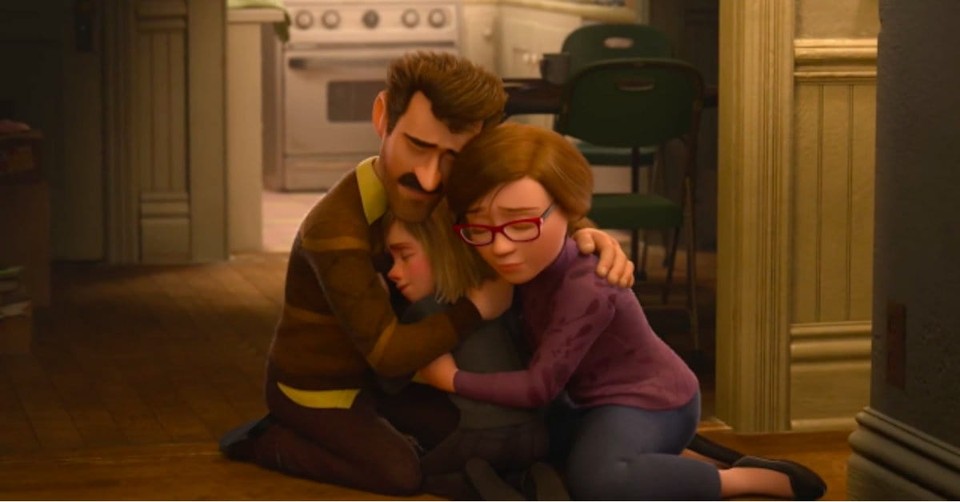Inside Out Can Help Parents Avoid This Big Mistake

Inside Out Can Help Parents Avoid This Big Mistake
My child, give me your heart.
~Proverbs 23:26 NRSV
Disney-Pixar’s latest blockbuster has a secret turning point that should serve as a warning sign to every parent. Take the wrong path at this sign, and you can inadvertently cause great pain in your child’s heart; take the right path, and you can help your child grow closer to the heart of God.
In Inside Out, the emotions of Joy, Sadness, Anger, Fear and Disgust are personified as animated characters operating the "control center" of 11-year-old Riley's brain. Riley is a happy, well-adjusted girl with loving parents, but her world has been uprooted when the family moves from Minnesota to San Francisco (as a dad, I perked up at this point, since I happened to be watching the movie with my soon-to-be-eleven-year-old daughter whom I have just moved to a new home in a new city).
Inside Riley's head, dominant emotion Joy finds herself challenged by increasing interference from Sadness after the move. The two embark on an odyssey through Riley's memory, only able to find their way back once Joy learns the value of Sadness. There's much to be learned from this “inside” story about how God uses even sadness to accomplish his purpose in our lives, but I want to turn our attention to a specific aspect of the "outside" storyline.
Riley isn't the only one affected by the move: her father's new venture is threatened by unpredictable investors; and her mother has to deal with a moving truck that is lost somewhere in Texas. After a stressful day, Riley's mother tells her that they need for her to be happy—that she should try not be sad for the sake of the family. It’s a well-meaning gesture, spoken without malice and intended to help Riley be strong. Yet it is this conversation that sets off the trouble inside Riley’s head.
The way writer/director Pete Docter and company tell the story, Riley's problem is not that she is experiencing sadness as a result of the move; her real problem is that she is trying so hard not to experience sadness. Inside her head, Joy literally draws a circle around Sadness and tells her not to come out of it. That fateful decision cuts Riley off from the help that she needs, driving her into depression and isolation. In one of Pixar’s most poignant scenes, Joy ultimately lets Sadness have control, Riley’s tears finally flow, and she is able to find the emotional support that she needs. I have to admit, not a few of my own tears were flowing by that point, too.

So what can Christian parents learn from Riley’s inside out adventure? I think the crucial lesson is this: kids need us to set boundaries on behaviors, but we should beware of setting boundaries on emotions. Telling your child how to act is necessary; telling your child how to feel is a disaster waiting to happen.
Like Riley's mother, we often do this inadvertently and with good intentions. I’ll admit to telling my children, "Don't be sad!" when they have experienced a disappointment, thinking I could help them be happy again by sheer willpower. I've also fallen into the trap of telling one child to act happy for the sake of a sibling, or for my wife's sake. Other times, I have confused teaching a behavior, like not whining and complaining, with controlling an emotion.
Perhaps most damaging of all is the insidious belief that God "needs" us to be happy. I'm not sure how, but I fell into this as a teenager. My unconscious line of reasoning went something like this: as evangelical Christians, we tell others that they will be happier if they accept Christ; therefore if I am unhappy, I am being a poor witness; ergo, I must shove down any feelings of sadness.
Simply put, that’s toxic spirituality. It fails as a witness because the world can see through our plastic smiles, and it's a recipe for an emotional breakdown if we never allow ourselves to feel difficult emotions for fear that we will be a disappointment to God. It creates a false idol that cuts us off from our Heavenly Father, who so longs to take us into his loving embrace.
But wait, didn't Paul teach us to "rejoice in the Lord always" (Phil. 4:4)? Yes, but we must remember that joy in the New Testament is a more complex idea that mere happiness, one that can include the presence of sadness. The same apostle reminds us to “Rejoice with those who rejoice, weep with those who weep" (Rom. 12:15 NRSV). If Jesus himself can be "deeply grieved, even unto death" in the Garden of Gethsemane (Matt. 26:38 NRSV), then surely we too can expect to experience sadness.
Of course, allowing ourselves and our children to express sadness is not the same thing as wallowing in self-pity. Like the Psalmist, we can learn to say, "Why are you cast down, O my soul, and why are you disquieted within me? Hope in God; for I shall again praise him, my help and my God" (Ps. 42:11 NRSV). But notice the progression: First, acknowledging sadness as real and giving it expression. Second, seeking out the reason for the sadness. Only then does the writer direct his own soul to find hope in God, a pathway which he knows will eventually lead back to joy and praise. This is no easy shortcut to “positive thinking,” this is the hard work of allowing grief and sorrow to have their place even while we hold on steadfastly to hope.
In the Proverb quoted above—“My child, give me your heart”—a father is seeking to guide his son away from destructive temptations. We are called as parents to help our children avoid sinful pathways that we know will lead to pain and heartache. However, for our sons and daughters to trust us with their hearts, they need to know that any emotion can be safely expressed.
In the days ahead, I know that I will need to keep a constant watch on my daughter as she enters a new school and faces the challenges of making new friends. Some days she may be happy, but others she will doubtless be sad. The last thing I want is for her to think there's something wrong with her for being sad—in my sight, or in God's eyes. My child, give me your heart—your whole heart. You can trust me.
This article originally appeared at ekroach.blogspot.com. Used with permission.
Ken Roach is co-author, along with Dr. Patrick M. Quinn, of the book How to Ruin your Child in Seven Easy Steps: Tame Your Vices, Nurture Their Virtues which shows how the tradition of the 7 Deadly Sins and 7 Cardinal Virtues provide an ancient parenting model for the modern-day parent. Patrick and Ken serve on the staff of Frazer United Methodist Church in Montgomery, Alabama. Patrick is a father of three and a foster parent, and Ken is a father of four.
Publication date: June 24, 2015
Originally published June 24, 2015.





